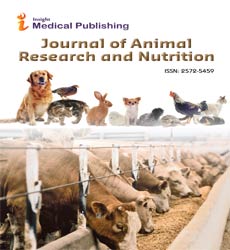Animal Performance with Cutting-Edge Feed
Emmanuel Kolobe*
Department of Agriculture and Animal Health, University of South Africa, South Africa
Published Date: 2023-06-11Emmanuel Kolobe*
Department of Agriculture and Animal Health, University of South Africa, South Africa
- *Corresponding Author:
- Emmanuel Kolobe
Department of Agriculture and Animal Health,
University of South Africa,
South Africa,
E-mail: Kolobe_e@gmail.com
Received date: May 11, 2023, Manuscript No. IPJARN-23-17092; Editor assigned date: May 13, 2023, PreQC No. IPJARN-23-17092 (PQ); Reviewed date: May 24, 2023, QC No. IPJARN-23-17092; Revised date: June 04, 2023, Manuscript No. IPJARN-23-17092 (R); Published date: June 11, 2023, DOI: 10.36648/2572-5459.8.3.086
Citation: Kolobe E (2023) Animal Performance with Cutting-Edge Feed. J Anim Res Nutr Vol. 8 No3: 086
Description
The use of antibiotics in animal feeding has been banned in many countries because of increasing concerns about the development of bacterial resistance to antibiotics and potential issues on food safety. Searching for antibiotic substitutes is essential. Applying trans generational epigenetic technology to animal production could be an alternative. Some environmental changes can be transferred to memory-like responses in the offspring through epigenetic mechanisms without changing the DNA sequence. In this paper, we reviewed those nutrients and non-nutritional additives that have trans generational epigenetic effects, including some amino acids, vitamins, and polysaccharides. The paternal Trans generational nutritional epigenetic regulation was particularly focused on mechanism of the substantial contribution of male stud animals to the animal industries. We illustrated the effects of paternal trans generational epigenetics on the metabolism and immunity in farming animals and proposed strategies to modulate male breeding livestock or poultry.
The genetic selection of the growth performance and nutrient optimization in domestic animals has significantly increased their growth performance and shortened their growth cycles. The selection is usually accompanied by increasing metabolic processes that might compromise the immune capacity in the body, leading to the occurrence of epidemiological diseases and retardation of animal growth. To overcome these issues, the use of Antibiotics Growth Promoters (AGPs) was widely adopted in the feed industries. Particularly, AGPs have been used as a growth promoter for a long time to maintain gut health and improve feed conversion efficiency.
However, the use of AGPs has been gradually banned in recent years worldwide due to their harmful roles in disturbing healthy intestinal micro biota and developing antibiotic resistance. Therefore, the use of AGPs in animal feeding has been gradually banned in recent years worldwide. However, banning the use of AGPs may increase the risk of conditioned pathogen infection in domestic animals and increase the feeding costs, meanwhile, it might increase the risk of infection in human beings. These situations highlight the need to explore novel alternatives to AGPs, which can support the productive potential and maintain the health of domestic animals. Recently, several classes of AGPs replacers have been studied and suggested, such as probiotics, prebiotics, antimicrobial peptides, polysaccharides, feed enzyme additives. However, these substitutes have been found not as effective as antibiotics in micro ecological modulation. Hence, exploring new approaches to decrease the immune and metabolic disorders related to no use of AGPs warrants investigating.
Stable Gene Expression Pattern
A stable gene expression pattern has been built via genetic selection and the use of AGPs for a century. Briefly, continuous genetic improvement of growth performance has continuously improved the metabolism and feed utilization efficiency. Most of the intake energy and nutrients are used for muscle and bone growth and fat accumulation, but less was provided for immune organs and function development. For instance, with the broilers' growth performance improvement, the total antibody titers, immunoglobulin M and immunoglobulin G content, as well as the function of macrophages and natural killer cells of broilers were all significantly reduced. Further, the heat production of broilers continues to increase, and the anti-stress ability of broilers was significantly decreased. Notably, the use of AGPs can help to maintain the health and then improve the growth performance, by overcoming those potential issues induced by the stable gene expression pattern of decreased immune function, increased metabolic heat production, and decreased anti-stress ability. In order to maintain the growth performance and health of domestic animals when the AGPs were banned, a novel and stable gene expression pattern should be built, by improving nutritional supplementation through several generations of those domestic animals. The relationships between gene expression patterns and environmental factors, especially nutritional changes, are the core part of the research, which could be easier linked to animal growth performances and immune functions. Therefore, applying trans generational epigenetic technology to animal production could be an alternative. The altered nutritional supplementation can be transferred to memory-like responses in the offspring through epigenetic mechanisms without changing DNA sequence. Nutrients that are effective in the regulation of the metabolism and immunity of animals include some functional nutrients and non-nutritional additives, such as amino acids, vitamins, polysaccharides, probiotics and prebiotics, which may be candidates for epigenetic regulation.
Antibiotics Growth Promoters
In this review, we explore the potential use of some of these improved nutrients supplementation in epigenetic effects on the growth performance and immune function in domestic animals, especially improving the offspring growth and immune and then eliminating the use of antibiotics in domestic animals.
Epigenetics refers to those studies on the inheritance of altered genes expression without DNA sequence mutation during the processes of cell mitosis, cell meiosis, biological development, and reproduction in animals. DNA methylation, histone modification, chromosome encoding, and non-coding RNAs have been suggested to be involved in the regulation and inheritance of gene expression alterations. Research on livestock epigenetics focuses mainly on 2 aspects: How environmental factors gradually alter epigenetic modifications of the genomes, thereby regulating the expression of associated genes, and how these epigenetic modifications and corresponding phenotypes are transmitted to their offspring. The latter aspect can be defined as trans generational epigenetics and likely, the influence of environmental factors is implemented on epigenetic modifications in the germ cells.
Comparing trans generational epigenetics with traditional genetics, they both have the trans generational inheritance ability, but trans generational epigenetics relates to the gene expression alteration that gradually adapts to the resulting environmental changes, likely being continuous, rather than gene mutation or the significantly increased frequency of one genotyping in traditional genetics.

Open Access Journals
- Aquaculture & Veterinary Science
- Chemistry & Chemical Sciences
- Clinical Sciences
- Engineering
- General Science
- Genetics & Molecular Biology
- Health Care & Nursing
- Immunology & Microbiology
- Materials Science
- Mathematics & Physics
- Medical Sciences
- Neurology & Psychiatry
- Oncology & Cancer Science
- Pharmaceutical Sciences
